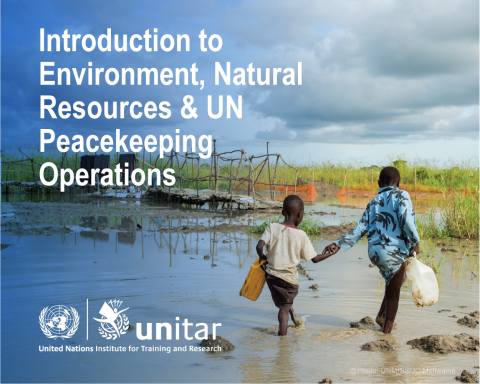
Introduction to Environment, Natural Resources and UN Peacekeeping Operations [PTP.2024.07E]
With a view to avoid and minimize the environmental impacts of peacekeeping missions, DPKO and the Department of Field Support (DFS) adopted an Environmental Policy for UN Field Missions in June 2009. Furthermore, Global Field Support Strategy was approved by Member States in 2010. While the main aim of this five year strategy is to improve operational efficiency and transform service delivery, one of its secondary aims is to reduce the in-country environmental impact of peacekeeping and special political missions.
However, despite these positive developments, recent policy analysis report, titled Greening the Blue Helmets: Environment, Natural Resources and UN Peacekeeping Operations, prepared by the UN Environment Programme (UNEP) in close collaboration with DPKO and DFS, has shown that while the new policy had catalysed positive change in some peacekeeping missions – including testing and field application of resource-efficient practices, technologies and behaviours – the adoption of the policy in the field has to date been limited and ad hoc. This report further identifies opportunities for peacekeeping operations to capitalize on natural resources to contribute to stability and early peacebuilding outcomes, including employment, livelihoods, economic recovery and reconciliation.
This training course focuses on the environment and natural resource management in a post-conflict context. It is a general awareness training that targets all military, civilian and police personnel and should be completed either pre-deployment or once in-mission. Key areas of learning include minimizing the environmental impact of peacekeeping missions, improving operational efficiency from an environmental perspective and addressing environmental and natural resource challenges at field level.
As a direct answer to the Greening the Blue report recommendation, the aim of this training module is to increase general awareness of key environmental and natural resource concepts to all peacekeeping staff.
The four learning objectives are:
- Linkages: At the end of the course, participants will be able to describe how environment and natural resource link to and affect peacekeeping operations.
- Benefits: At the end of the course, participants will be able to identify the multiple benefits of addressing environment and natural resources in peacekeeping.
- Policies: At the end of the course, participants will be able to describe how environment and natural resources are addressed by UN peacekeeping policies and mandates as well as sources of good practice.
- Responsibilities: At the end of the course participants will be able to explain personal responsibilities and actions to be taken by every peacekeeper to implement the DPKO/DFS environmental policy.
The course is broken down into three main sections:
- Introduction to the learning objectives and key concepts;
- Seven main reasons to care about environment and natural resources in peacekeeping operations;
- What can each of us do to address environment and natural resource challenges at the field level?
Click on the tabs on the left to discover the four learning objectives of this module. Estimated time of completion: 2 hours.
The course is self-paced. Content is presented through interactive slides, videos, maps and graphs. The learners will be assessed based on a quiz at the end of the course.
This general awareness raising training targets all military, police and civilian personnel working in or interested in working in peacekeeping operations.
Copyright
This training module was developed by UNEP’s Post-Conflict and Disaster Management Branch in collaboration with UNITAR and the International Institute for Sustainable Development (IISD).
For administrative queries, contact ptp [at] unitar.org (ptp[at]unitar[dot]org)
Certificates of completion will be sent to participants, upon the successful completion of the end-of-course quiz and after participants have filled out the course evaluation form.
Technical Requirements
UNITAR recommends the following as a minimum in hardware and software to take our e-Learning courses. Please consult your Network Administrator or Systems person to ensure that you have the following:
Hardware requirements
- Desktop or laptop computer with Windows 10 or MacOS version 11 and later
- Tablet or mobile devices are not fully supported on some course tools
- Stable LAN or Wifi Internet connection
Browser
- Latest version of Mozilla Firefox (download for free at https://www.mozilla.org)
- Latest version of Google Chrome (download for free at https://www.google.com/chrome)
- Microsoft Edge or Safari (included in your computer)
Other software
- PDF reader (download for free at https://get.adobe.com/uk/reader)
- Microsoft Office for Windows or MacOS (compatible software can be downloaded at http://www.openoffice.org/)
- Video player (Quicktime for MacOS, Windows Media Player or compatible video player)
- Anti-virus
Other requirements
- Disable Pop-up blockers
- Enable cookies and java
- webcam and audio headset for courses that will require online meetings
- additional storage in case you need to download course materials
You will receive an email with the detailed information on how to access the course within 48 hours from the registration. Please kindly check your spam or junk inbox.

